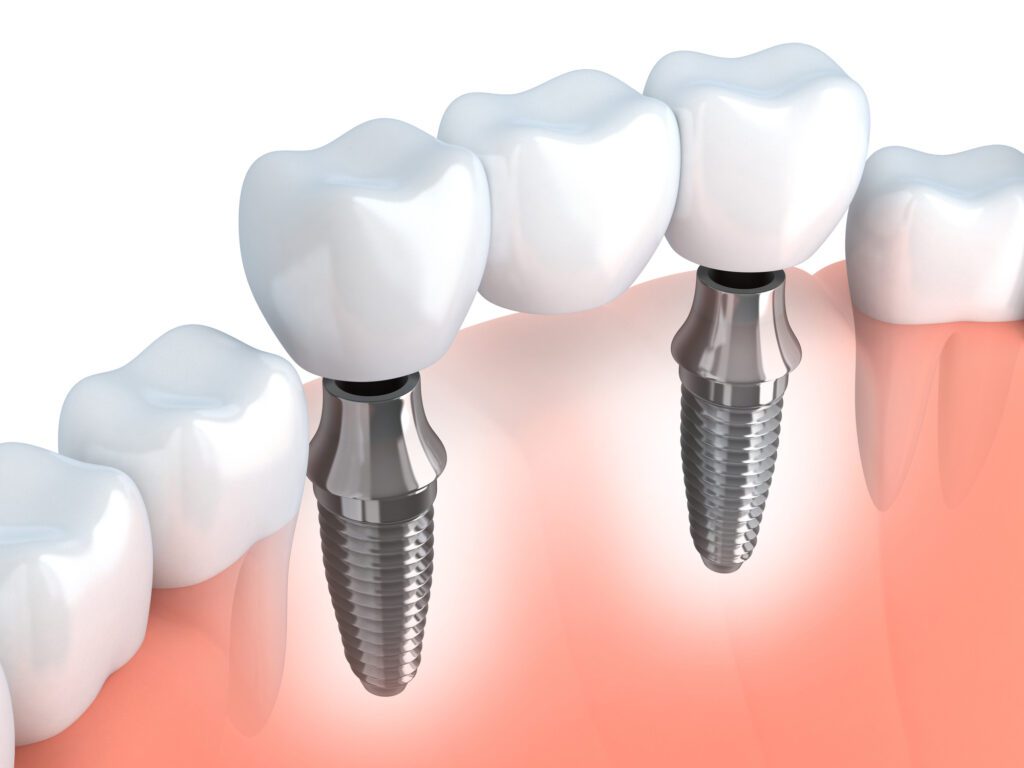A dental bridge is a sophisticated restorative dentistry treatment that will replace a missing tooth or several missing teeth. This dental prosthetic is designed to restore function, aesthetics, and oral health. Dr. Walter M. Mazzella can provide you with a dental bridge in Ellicott City, MD if suffer from tooth loss. There are several types of bridges available to accommodate our patient’s different and unique needs.

What is a Dental Bridge?
A dental bridge is a custom-made dental appliance that Dr. Mazzella uses to replace one or more teeth. It consists of one or more artificial teeth, called pontics, held in place by dental crowns attached to adjacent healthy teeth or dental implants. Dental bridges are designed to literally bridge the gap between the healthy teeth or implants. Today’s bridges are custom made so that they will match your natural teeth in color, shape and size. This way they will blend in with your surrounding teeth and create a natural appearance.
The Benefits of a Dental Bridge
A dental bridge will improve your oral health and the aesthetics of your smile. By filling in the gaps in your smile, you will be able to smile with confidence again. Additionally, replacing missing teeth is simply good for your oral health for multiple reasons. Dental bridges provide a durable and long-lasting solution for missing teeth, significantly improving the patient’s quality of life. The many benefits of dental bridges include:
- Restored Functionality: Dental bridges restore the ability to chew and speak properly. Missing teeth make it difficult to chew food efficiently and pronounce words. By replacing teeth, you will improve your overall oral function.
- Enhanced Aesthetics: A dental bridge will fill in the gaps in your smile. This will enhance your smile’s appearance and boost your confidence. This can impact all aspects of your life.
- Prevents Teeth Shifting: By filling in the gaps left by missing teeth, a dental bridge can prevent the adjacent teeth from shifting out of alignment. This will help maintain proper bite and alignment.
- Preserves Facial Structure: Dental bridges help maintain facial structure by preventing the collapse of facial muscles and preserving natural facial contours.
- Improved Speech: Restoring missing teeth with bridges aids in clear speech, ensuring patients can communicate effectively.
Types of Dental Bridges
Removable Bridge: A removable dental bridge, also known as a partial denture, can be taken out for cleaning. It consists of replacement teeth attached to a pink or gum-colored plastic base. Removable bridges are convenient for patients who prefer a non-permanent solution.
Traditional Fixed Bridge: Fixed bridges are permanently cemented in place and cannot be removed by the patient. They are anchored to adjacent natural teeth (abutments), providing stable and long-lasting support. It is typically used to replace one tooth however it can replace several teeth.
Maryland Bonded Bridge: A Maryland bonded bridge, also called a resin-bonded bridge, is composed of artificial teeth and metal or porcelain wings on each side. These wings are bonded to the back of adjacent natural teeth, making it a conservative and minimal-preparation option.
Cantilever Bridge: Cantilever bridges are used when there are adjacent teeth on only one side of the gap. The bridge is anchored to a single natural tooth or dental implant, providing a functional solution in specific cases.
Implant-Supported Bridges: Dental implants can also be used to anchor the bridge in place. This is a suitable solution for patients missing multiple missing teeth in a row. The bridge is made up of several pontics that will fill in the gaps and the dental crowns. The crown portion of the bridge will be secured to the dental implants instead of healthy, remaining teeth. Dental implants are titanium posts are must be surgically placed in the jawbone. This type of bridge offers exceptional stability, durability, and preservation of bone density.
Dental Bridge Repair
Dental bridges may require repair if they become loose, damaged, or if there is a change in the supporting teeth or implants. Repairs can involve adjustments, adding new crowns, or replacing the entire bridge. Regular dental check-ups are essential to detect issues early and prevent further complications.
How to Care for a Dental Bridge
Proper oral hygiene is crucial for maintaining dental bridges. This will prevent gum disease and other dental problems that can cause issues with your bridge. Patients should clean the dental bridge and surrounding gums using floss threaders, interdental brushes, or water flossers daily. You will need to do this along with regular teeth brushing and flossing every day. Regular dental visits allow dentists to assess the bridge’s condition, ensuring longevity and preventing potential complications.
If you suffer from missing teeth, Dr. Mazzella can provide you with a custom dental bridge in Ellicott City, MD. Please call (410) 559-9951 to book and appointment or you can also request an appointment online by filling out the form.
